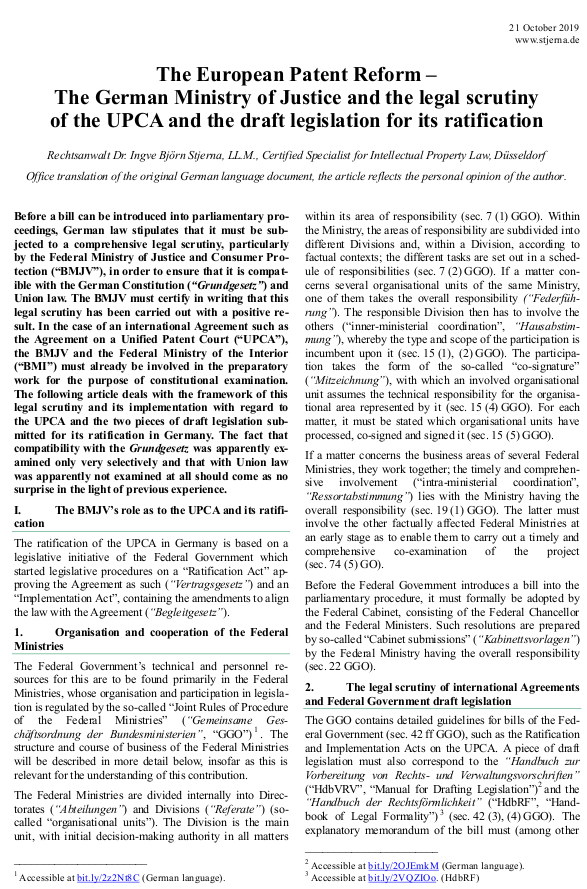

Ingve Björn Stjerna's latest Unitary Patent/Unified Patent Court/Community Patent/EU Patent (yes, the advocates keep shuffling names to confuse us) paper is out. It's about a dozen pages long (that's just page 1 above), so it oughtn't take more than an hour to read.
"New Stjerna UPC article published today: The European Patent Reform: The German Ministry of Justice and the legal scrutiny of the UPCA and the draft legislation for its ratification," Benjamin Henrion wrote, as this new publication [PDF] was made available yesterday (as per the date on the paper).
"It's about a dozen pages long (that's just page 1 above), so it oughtn't take more than an hour to read."The UPC is really, really awful. It may not be simple to track its history because names changed over time. A decade ago it had another acronym altogether. But Team UPC cannot fool us; it can trick us for a while, but sooner or later people realise that words like "unity" or "union" are just euphemistic marketing blankets for something pretty awful that extends the powers and reach of a totally unaccountable European Patent Office (EPO), led by dangerous people such as António Campinos and Battistelli, advocates of software patents in Europe, breakers of European laws, breakers of labour laws, union busters, censors, illegal spies, thieves and worse. At least one of them should have been arrested for bringing weapons to the EPO (in direct breach of very strict German laws).
"The UPC is really, really awful."Henrion has assessed the paper and admitted he has not yet "read the FOIA documents [Stjerna] managed to get [...] Basically German gov did not do its homework on economic impact of UPC [...] notably on the impact for small companies which will be negative, as cost of litigation will be higher..."
To quote from and around page 11 (last page): "the costs of the European patent reform for the economy, in particular for small and medium-sized enterprises, were not addressed in the draft ratification laws."
And from page 1: "[...] The GGO contains detailed guidelines for bills of the Federal Government (sec. 42 ff GGO), such as the Ratification and Implementation Acts on the UPCA."
What does the EPO have to say about all this? Not much. Not anymore. The EPO grants lots of fake patents, hoping to render them 'unitary' some time in the future. They call these European Patents even though a very significant majority of them are not European at all. They're being granted mostly to large foreign (outside Europe) companies, notably the United States.
"The EPO grants lots of fake patents, hoping to render them 'unitary' some time in the future."The EPO has just tweeted: "It is a pleasure to announce that Andrei Iancu, Director @USPTO, will join us for this year's Patent Information Conference in Bucharest in less than 10 days' time."
Today's Director of the U.S. Patent and Trademark Office (USPTO) is the "American Battistelli", Andrei Iancu (born in Hungary). He comes to the EPO to advance the litigation 'industry' agenda (he comes from there) and maybe he will lecture them on how to ignore courts and judges. This is what he does in the US, just like Battistelli and Campinos in Europe.
A short while ago the EPO also wrote: "Last month, EPO examiners & formalities officers were invited to discuss the challenges related to patenting additive manufacturing ( #3Dprinting). This field has become a driving force in various industries."
"But the EPO -- like the UPC -- has nothing to with innovation and science. It's all about litigation and monopolies that guard themselves by suing the competition (or threatening to sue).""What an absolutely terrible example," I responded to them. "It is widely known (ask ANYBODY in the field) that #patents on #3dprinting curtailed #innovation in this space for DECADES!"
But the EPO -- like the UPC -- has nothing to with innovation and science. It's all about litigation and monopolies that guard themselves by suing the competition (or threatening to sue). SMEs don't matter; it's just something the EPO name-drops in "tweets" every other day. ⬆